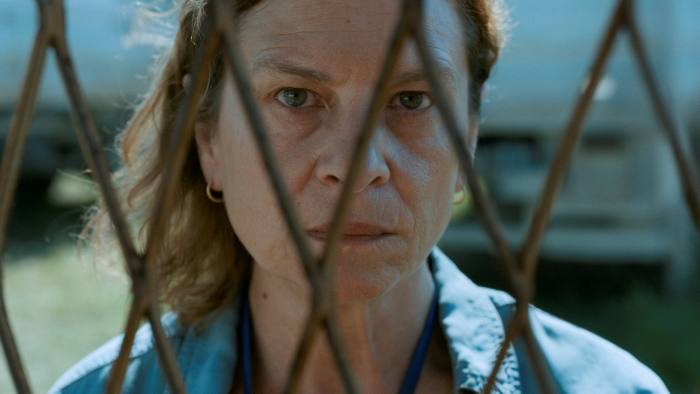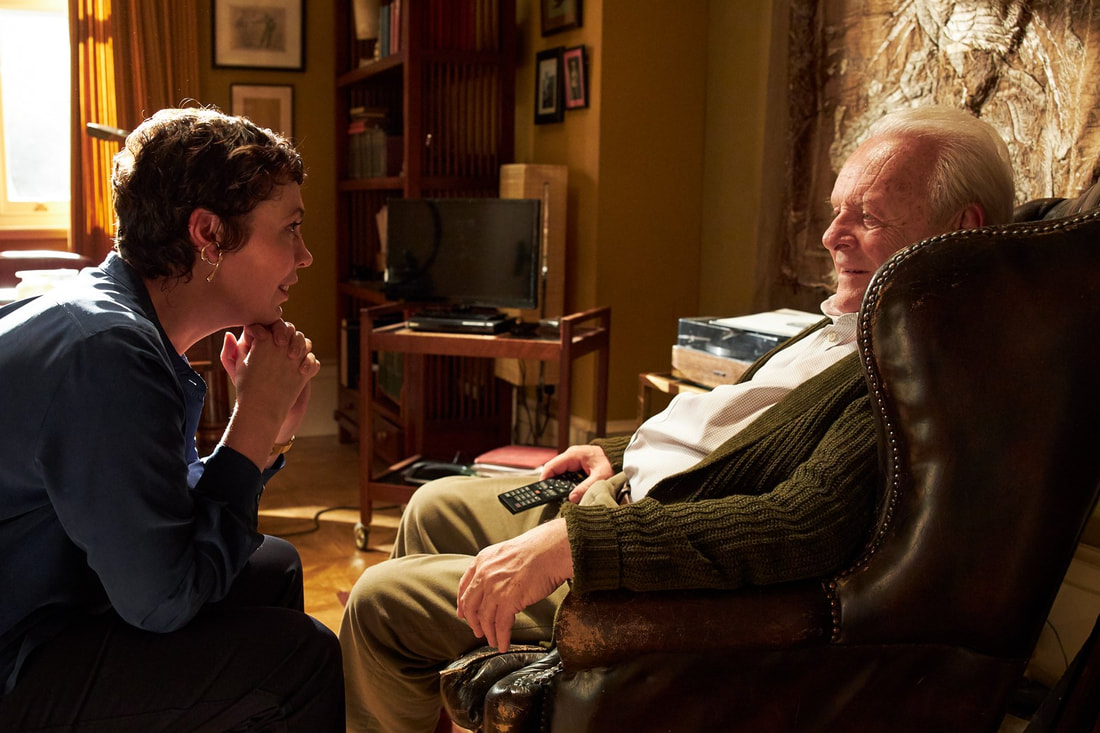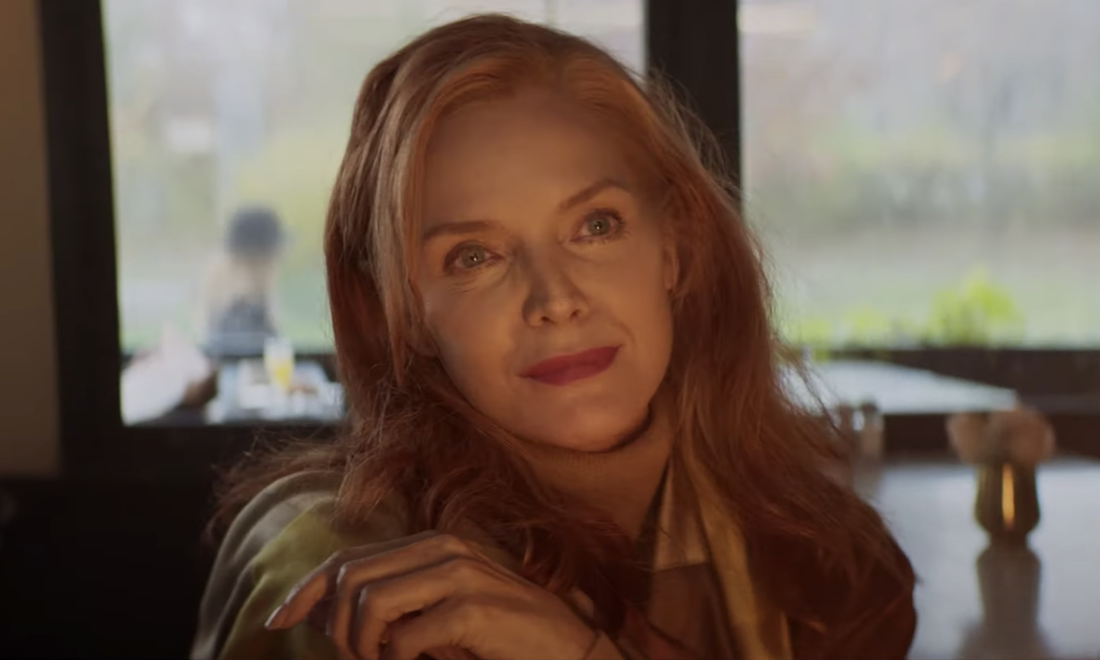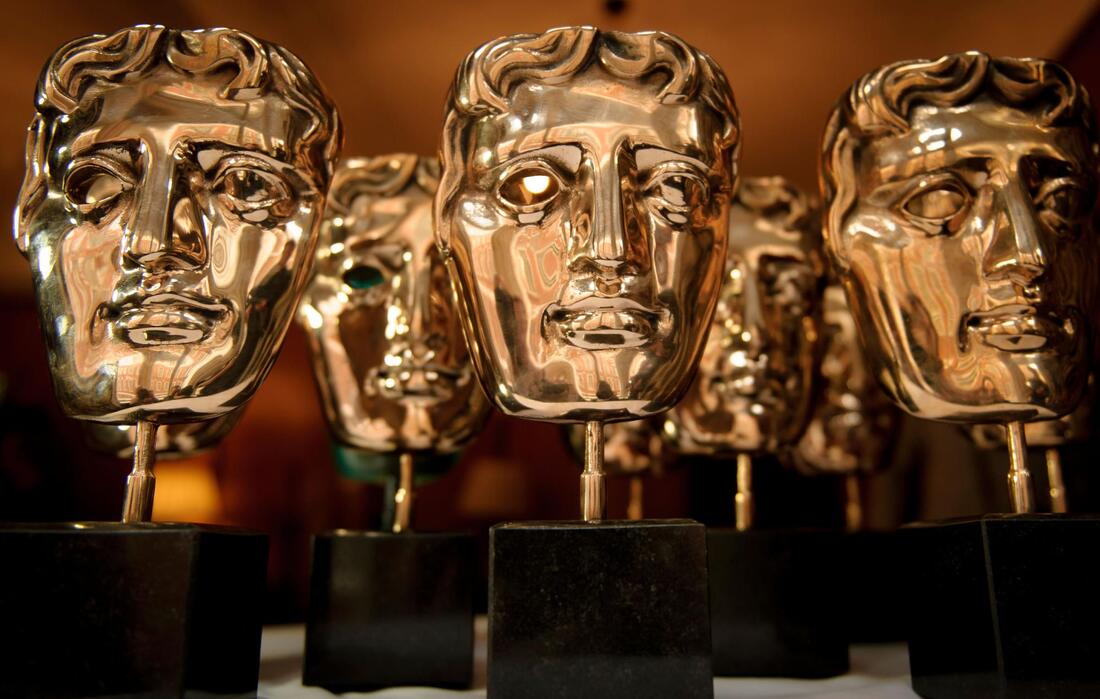|
Jasna Ðuričić in Quo Vadis, Aida (2021) Set during the Bosnian war, Quo vadis, Aida is a devastating dramatization based on the Srebrenica genocide that took place in July 1995. Prior to the genocide, the United Nations had declared this small town a “safe zone” under UN protection. The town was then invaded and captured by the Serbian army. 30,000 Bosnian civilians were expelled from their homes and left looking for shelter. 8,372 Bosnian men and boys were murdered. For her fifth feature film, writer-director Jasmila Žbanic avoids explicitly showing the violence of such atrocities. She stays with the citizens, showing the solidarity between people who are displaced and who are desperately holding onto a semblance of promise. The story is told from a fascinating perspective, that of a woman walking through two worlds with the weight of both on her shoulders.
The titular character Aida (Jasna Ðuričić) is a translator for the UN in Srebrenica. When the Serbian army takes over the town, her husband Nihad (Izudin Bajrović) and son Ejo (Dino Bajrović) are among the civilians looking for shelter, while her son Hamdija (Boris Ler) is at a full-capacity UN base with her. The majority of the film takes place at this base, where thousands of civilians (and thousands more outside the gate with nowhere else to go) await news of what comes next. All the while, their fates have been cruelly decided. As an interpreter, Aida is one of the first to learn crucial information about what's going on behind closed doors. Given the horrific failings by the UN, Aida wrestles with taking care of her family while also doing her job. Quo vadis, Aida is a haunting, collective experience that transcends the screen and makes an unforgettable emotional impact. The film opens with a conversation about the fate of 30,000 people. Aida is sat at a table interpreting negotiations between Serbian forces and UN peacekeepers. What will be done to ensure the civilians’ safety? Will everyone be moved to a shelter? While this scene is full of blatant false promises, Žbanic still maintains a sense of lingering hope which can also be felt deeply throughout the film, through her depiction of the humanity in this community of civilians. Characters are sometimes heard in the background calling Aida’s name to ask for help, or because they want her to explain what’s going on. These are her neighbours, her friends, people she went out dancing with (as seen in a haunting flashback that lingers on many of their faces). 30,000 civilians were displaced, and everyone had their own story. The fictional character of Aida is not based around one person, but on countless experiences of women who lived through the atrocities of what happened. As a result, Žbanic’s discussions with women and research on witness documents helped shape the protagonist. Jasna Ðuričić gives a tour de force performance as Aida. She carries the weight of this story with unrelenting humanity. From the moment she appears on screen, it’s clear that she is the one to lead this journey and carry the film on her shoulders. Ðuričić maintains an extraordinarily immersive, visceral connection and commands every second of her screen time. Her performance is a stunning reflection of a character existing in two worlds; Aida’s destiny is linked to everyone else’s, and at the same time, her job provides a window of security that she uses to benefit her family as much as she can. She’s in an emotionally draining position of having to make such crucial decisions on the fly. She's also carrying the weight of her role as UN interpreter, having to translate dire news to thousands of Bosnian civilians who have no clue what’s going to happen and whom she cannot protect. In addition to Ðuričić’s performance, and a wonderful supporting cast who make this experience all the more immersive to watch, one of the film’s greatest strengths is the screenplay. Žbanic maintains a strong depiction of how dehumanization starts with language, and how quickly words crumble in the face of pressure. During the few negotiation scenes in this film, only words are spoken and there is still an immense feeling of tension polluting the air. Žbanic also brings a lot of focus onto interesting dynamics between Aida and the civilians, to whom she is connected, yet her access gives her a level of protection not afforded to them. Aida shares compelling dynamics with each of the characters she comes into contact with, including the UN officials whose failed response during a time of need propels her to take matters into her own hands. Quo vadis, Aida is a harrowing journey and a compelling film to watch unfold. It’s a powerful depiction of history that raises awareness about the Srebrenica genocide and the lives that were so brutally taken. It’s a resonating story about solidarity, humanity, and hope bringing people together. It’s a phenomenal showcase of Jasna Ðuričić’s talent, as she plays a mother who will do absolutely anything in her power to protect her family. Filmmaker Jasmila Žbanic explores so many layers of this subject matter from an invigorating point of view, and poses a reminder that Aida’s perspective is a collection of so many real-life experiences.
0 Comments
Happy spring everyone! 💐🌷
This season is a time of change. A fresh start, a new outlook, a moment of growth. The transition from winter to spring is a rejuvenating one, energized by an eagerness to create something new and stop to smell the roses in sun-kissed weather. Spring can be felt deeply on screen, whether or not stories are set during this season. Some movies purely look like spring, full of rolling hills and vibrant flowers. Some movies are about characters who go through a personal metamorphosis and blossom into a new way of life. Here are some inspiring springtime favorites to check out. Olivia Colman and Anthony Hopkins in The Father (2021) Perspective plays a compelling role in The Father, the debut feature by writer-director Florian Zeller. Adapted from Zeller’s 2012 stage play, this film tells a sensitive and terrifying story about Anthony (Anthony Hopkins), who refuses assistance from his daughter Anne (Olivia Colman) and numerous carers as the fabric of his mind rapidly changes. Suffering from dementia, Anthony tries to make sense of his circumstances and begins to doubt his loved ones in the process. Zeller’s direction holds a mirror reflection to Anthony’s loss of memory, communication, and thinking. The film evokes a strong feeling of disorientation, like being in one place and somewhere else at the same time. Rather than focusing on an outsider’s point of view, the effects of dementia are conveyed directly from Anthony’s perspective. How does this character feel about what’s happening to him? How does his illness change the way he looks at his family? How does he navigate other people’s perceptions of him? How does he react to the constant changes in space and time? Zeller tackles all of these questions and then some, which makes the experience of watching The Father feel so heartbreakingly real.
The story takes place primarily in one setting: a small North London flat that becomes another character in the film. Through the use of furniture, proportions, and lighting, Zeller is able to create a place that feels familiar and different at the same time. After a while of seeing the same knick knacks and corridors, there is a feeling that something has changed at some point without knowing exactly what. Peter Francis’ production design on this film is absolutely stellar, as is Cathy Featherstone’s set decoration. Over the course of the story, subtle differences are made to the positioning of objects and the location of rooms. The metamorphosis of Anthony’s flat is a striking example of how the film holds a mirror to his frame of mind from a technical standpoint. The editing by Yorgos Lamprinos is also completely in tune with Zeller’s vision. One of the reasons for The Father’s journey being so emotionally resonating is the structure, which strives for a truthful depiction of Anthony’s point of view in each and every moment. For example, when the film first introduces Anthony in his flat, there is no doubt that this place is his. The pacing of the film has a slow start but in retrospect, Zeller is laying out a truthfully inventive foundation for the maze of contradictions that follows. Situations arise and Anthony begins to question himself. He realizes just how far away he is from the fabric of his own reality. He realizes just how quickly time slips away. The film incorporates a resonating symbol into this story, a recurring moment between Anthony and his watch. Believing that his watch was stolen, every now and then he will recall that he needs to look for it. The watch is an interesting symbol of time disappearing…one can’t make more of it, nor can one control it. To watch Anthony's shock and confusion by the passing of time is devastating. In addition to the structure and technical details, the film brings together a remarkable group of actors (especially Hopkins and Colman) who create magic on screen. Florian Zeller initially wrote The Father with Anthony Hopkins in mind, hence the character’s name Anthony. To see Hopkins bring this character to life, with the screenplay by Zeller and co-writer Christopher Hampton as a springboard, is an astonishing experience. He completely embodies the role and gives the best performance of his career. Anthony’s fear, heartbreak, confusion, loneliness, and moments of vicious spite are a tough watch. This is a character crumbling in real-time, losing his bearings from one moment to the next. Hopkins commands the screen with an instinctive, profoundly moving performance that gets inside the headspace of a person living with dementia. Another example of pitch perfect casting is Olivia Colman as Anthony’s daughter. Anne is a character one can immediately empathize with; she’s in a tough spot of answering the question of what to do when someone you love is suffering from dementia. The responsibility falls on her to make decisions on her father’s behalf, and at the same time, she tries so desperately to make him understand the reality of what’s going on but she can’t get through to him. Colman has such an exquisite talent, and once again shows her ability to convey such complex emotions in the blink of an eye. Anne’s dedication, vulnerability, sadness, and pure love for her father are written across her face. So many of her interactions with Anthony are devastating to watch, particularly when a third character is involved and she’s trying to make peace with everyone. Committed performances by Olivia Williams, Imogen Poots, Mark Gatiss, and Rufus Sewell further perpetuate an atmosphere of paranoia. Their characters are also seen from Anthony’s perspective and thus take on a different meaning throughout the film. From the outside looking into this depiction of dementia, one can never truly know what it’s like to live with this illness. What makes Florian Zeller’s debut feature so compelling is his decision to tell the story from Anthony’s perspective, following so closely alongside his frame of mind throughout the film. Zeller introduces a strong narrative and presents reality as Anthony knows it, which shows the day-to-day effects that dementia has on this character. It’s a story told from the inside out, creating the experience of being inside Anthony’s head and feeling a part of something much bigger than him. The film shares universal topics of living with dementia, along with being a family member of someone who has this illness, in an up-close and personal kind of way. The Father is a phenomenal achievement, a stunning balance of drama and psychological horror that leads with big-hearted sensitivity. Visual design by Shawna X It’s been a long award season, but we’re finally here! This morning, the Academy of Motion Picture Arts & Sciences announced its nominees honoring the best in films from the past year. Mank leads the way with 10 nominations.
Chloé Zhao and Emerald Fennell received Best Director nominations, the first time in 93 years that more than one woman was nominated in this category in the same year. Minari is the first Asian American produced, directed, and cast film to receive a Best Picture nomination. Viola Davis and Andra Day received Best Actress nominations, only the second time two Black women were nominated in this category in the same year. It’s wonderful to see history being made, and also unfortunate how long it took to reach this point. Some unfortunate snubs made this morning include Delroy Lindo (Da 5 Bloods) in Best Actor, Regina King (One Night in Miami) in Best Director, and La Llorona in Best International Feature. All three films are available to stream on Netflix, Amazon Prime, and Shudder respectively. The Academy collaborated with 7 international artists to create the visual design for the 93rd Oscars. The artists were asked to personally answer the following question: what do movies mean to you? Click the link below for their interpretations of the Oscar statuette. 💥⚡️🌈 https://www.oscars.org/press/press-kits Featured artists: Shawna X; Petra Eriksson; Magnus Voll Mathiassen; Karan Singh; Michelle Robinson; Temi Coker; Victoria Villasana The 93rd Academy Awards ceremony will take place Sunday, April 25th at 8:00 pm (EST) on ABC. Read the full list of nominees below: Best Picture The Father Judas And The Black Messiah Mank Minari Nomadland Promising Young Woman Sound of Metal The Trial Of The Chicago 7 Best Director Thomas Vinterberg - Another Round David Fincher - Mank Lee Isaac Chung - Minari Chloé Zhao - Nomadland Emerald Fennell - Promising Young Woman Best Actress Viola Davis - Ma Rainey's Black Bottom Andra Day - The United States vs. Billie Holiday Vanessa Kirby - Pieces Of A Woman Frances McDormand - Nomadland Carey Mulligan - Promising Young Woman Best Actor Riz Ahmed - Sound Of Metal Chadwick Boseman - Ma Rainey's Black Bottom Anthony Hopkins - The Father Gary Oldman - Mank Steven Yeun - Minari Best Supporting Actress Maria Bakalova - Borat Subsequent Moviefilm Glenn Close - Hillbilly Elegy Olivia Colman - The Father Amanda Seyfried - Mank Youn Yuh-jung - Minari Best Supporting Actor Sacha Baron Cohen - The Trial Of The Chicago 7 Daniel Kaluuya - Judas And The Black Messiah Leslie Odom Jr. - One Night In Miami Paul Raci - Sound of Metal LaKeith Stanfield - Judas And The Black Messiah Best Original Screenplay Judas And The Black Messiah Minari Promising Young Woman Sound Of Metal The Trial Of The Chicago 7 Best Adapted Screenplay Borat Subsequent Moviefilm The Father Nomadland One Night In Miami The White Tiger Best Animated Feature Onward Over the Moon A Shaun the Sheep Movie: Farmageddon Soul Wolfwalkers Best Documentary Feature Collective Crip Camp The Mole Agent My Octopus Teacher Time Best International Feature Another Round Better Days Collective The Man Who Sold His Skin Quo Vadis, Aida? Best Cinematography Judas And The Black Messiah Mank News of the World Nomadland The Trial of the Chicago 7 Best Costume Design Emma. Mank Ma Rainey's Black Bottom Mulan Pinocchio Best Film Editing The Father Nomadland Promising Young Woman Sound Of Metal The Trial of the Chicago 7 Best Makeup & Hairstyling Emma. Hillbilly Elegy Ma Rainey's Black Bottom Mank Pinocchio Best Production Design The Father Ma Rainey's Black Bottom Mank News of the World Tenet Best Sound Greyhound Mank News of the World Soul Sound of Metal Best Visual Effects Love And Monsters Mulan The Midnight Sky The One And Only Ivan Tenet Best Original Score Da 5 Bloods Mank Minari News of the World Soul Best Original Song Judas and the Black Messiah - "Fight for You" The Trial of the Chicago 7 - "Hear My Voice" Eurovision Song Contest: The Story of Fire Saga - "Husavik (My Hometown)" The Life Ahead - "Seen" One Night in Miami - "Speak Now" Best Animated Short Burrow Genius Loci If Anything Happens I Love You Opera Yes People Best Documentary Short Colette A Concerto Is a Conversation Do Not Split Hunger Ward A Love Song for Latasha Best Live-Action Short Feeling Through The Letter Room The Present Two Distant Strangers White Eye Michelle Pfeiffer in French Exit (2021) French Exit is a surreal film to watch unfold. Directed by Azazel Jacobs and based on the book by Patrick DeWitt, the story subverts expectations at any given moment. Weaving through humour and tragedy, the film takes wild turns as a comedy of errors pushing towards unpredictability. While not always easy to jump on board and embrace the ridiculousness of it all, Michelle Pfeiffer proves to be the perfect anchor. She plays Frances Price, a Manhattan socialite whose life is on the verge of falling to pieces. Faced with major financial troubles as her inheritance is running out, she takes up a friend’s offer to move into a small apartment in Paris with her son Malcolm (Lucas Hedges) and their cat. While there, we are introduced to loose acquaintances and loved ones, as they start scratching the surface of an enigmatic, larger-than-life protagonist who plays her cards close to her chest. So much of this film is about what isn’t said between people, which brings up an intriguing question of what the characters are choosing not to reveal. French Exit is full of eccentric characters interacting in a world where nothing is as it seems. DeWitt’s story gives the supremely talented Michelle Pfeiffer, along with a strong supporting cast, an interesting chaotic canvas to work with.
Frances is the star of her own show. Every move she makes is followed by a spotlight, as she performs center stage of her own life to the point where her character feels theatrical. It’s a larger-than-life role that Pfeiffer plays the absurdity of to entertaining degrees, from her zinging line deliveries to the way she carries herself. She keeps the laughs coming, that is until her circumstances become more and more reflective of the distress she feels (particularly towards herself). Pfeiffer balances on a fine line between portraying someone who lives such a narcissistic existence and who is also haunted by her past choices. Having remained absent from her son’s life for most of his childhood, her decision to pick him up from school out of the blue one day (as shown in a flashback scene) rejoins the two but can’t make up for lost time. For most of the film, Frances and Malcolm speak to each other matter-of-factly in brief moments. Their relationship is a reflection of things that never really get to be said, particularly between a parent and child. Only until Frances realizes the substantial passing of time, and how much she loves her son, are they able to have a more revealing conversation addressing why she left in the first place. Pfeiffer and Hedges share an interesting monologue where these two characters are faced with her reasoning. It’s one of the few moments in the film that provides a clearer window into the vulnerability of Frances especially, who carries herself with all-encompassing grandeur. The story of French Exit, which Patrick DeWitt adapted for the screen, builds structure around characters who exist often in their own worlds. With an increased focus on Frances as the protagonist, everyone in her orbit seems to exist based on what they mean to her (and her son) and how they fit specifically in her world. Everyone in her orbit (whether related by blood or by fantasized friendship) is vying for something to say, without really knowing how best to say it. Their dynamics raise an interesting train of thought about the influence Frances has on others, and about what people project onto her. After the move to Paris, Frances and Malcolm get invited to a party, which she expects to be a glitzy high society gathering. But when they arrive, they realize it’s a party of three with Mme. Reynard (Valerie Mahaffey), one of Frances’ long-time admirers from New York who thinks they ought to be friends. This “party” sequence is a fabulous example of how much acting relies on reacting. Mme. Reynard is a lonely widow who sees an opportunity for kinship with Frances; they’re just about the same age and presumably ran in the same socialite circles back in New York. She misses the Manhattan socializing, and so discovering Frances’ move to Paris opens up a world of possibilities for her to live again. Pfeiffer and Mahaffey play off each other so brilliantly; their scene is one of many moments in the film that is full of disengagement, curiosity and eccentricity as these characters find each other under odd circumstances. The disengagement in particular is so extreme throughout the film that even when otherworldly elements are introduced later on in the story, the characters are completely unfazed. In addition to the strained mother-son relationship, there’s an underlying resonating theme of craving for connection without knowing how best to achieve it. The characters in this film interact and are brought together in such an unusual way. The story sprawls into a big ensemble piece halfway through where everyone vies to make sense of their circumstances and determine where they fit. It’s an ensemble of great actors including Imogen Poots, Danielle Macdonald, Susan Coyne, Isaach De Bankolé, and Tracy Letts. Among the cast, the supporting star of the show is indeed Valerie Mahaffey who steals every scene. Mme. Reynard is a great supporting role that pushes for authenticity and sincerity in the most absurd of moments. She so badly wants a connection to Frances and as the film progresses, makes herself at home in Frances’ apartment, a setting that becomes almost like a magical realm in which everyone who enters seems to stumble upon some insight about themselves. While the absurdity of the story makes for some fun exploration of where these characters will end up, it is sometimes a chore to find an emotional connection beyond Pfeiffer and (to a lesser extent by way of screen time) Mahaffey. French Exit is a strange melancholic journey, one that entices yet pushes away as circumstances grow more absurd. The story takes a big turn halfway through, and nothing is what it seems especially from that point forward. But the consistent anchor is Michelle Pfeiffer’s performance, an entertaining concoction of emotions that play humorously until the mask is off and Frances’ ghosts come back to haunt her. French Exit is an interesting rollercoaster of absurdism about larger-than-life characters who are searching for real connections to each other. The EE British Academy Film Awards (BAFTA) have announced their nominations celebrating the best in film of 2020. The list of nominations is full of snubs, which in a way is something to celebrate. Unexpectedly missing the cut were major contenders such as Carey Mulligan (Promising Young Woman) and Olivia Colman (The Father), who have done well throughout this awards season. To the point, this year’s BAFTA nominees feel like a refreshing change of pace, giving recognition to a lot of wonderful (and often small) films that were not being recognized otherwise. Films such as Sarah Gavron’s Rocks, Remi Weekes’ His House, Shannon Murphy’s Babyteeth, and Radha Blank’s The Forty-Year-Old Version reflect some of the many brilliant creatives who made beautiful work in the past year, amongst the Oscar contenders we’ve been hearing about more often. Here is the full list of nominations:
Best Film The Father The Mauritanian Nomadland Promising Young Woman The Trial of the Chicago 7 Outstanding British Film Calm With Horses The Dig The Father His House Limbo The Mauritanian Mogul Mowgli Promising Young Woman Rocks Saint Maud Outstanding Debut by a British Writer, Director or Producer His House, Remi Weekes (Writer/Director) Limbo, Ben Sharrock (Writer/Director) and Irune Gurtubai (Producer) [also produced by Angus Lamont] Moffie, Jack Sidey (Writer/Producer) [also written by Oliver Hermanus and produced by Eric Abraham] Rocks, Theresa Ikoko and Claire Wilson (Writers) Saint Maud, Rose Glass (Writer/Director) and Oliver Kassman (Producer) [also produced by Andrea Cornwell] Film Not In The English Language Another Round Dear Comrades! Les Misérables Minari Quo Vadis, Aida? Documentary Collective David Attenborough: A Life On Our Planet The Dissident My Octopus Teacher The Social Dilemma Animated Film Onward Soul Wolfwalkers Director Thomas Vinterberg, Another Round Shannon Murphy, Babyteeth Lee Isaac Chung, Minari Chloé Zhao, Nomadland Jasmila Žbanić, Quo Vadis, Aida? Sarah Gavron, Rocks Original Screenplay Tobias Lindholm and Thomas Vinterberg, Another Round Jack Fincher, Mank Emerald Fennell, Promising Young Woman Theresa Ikoko and Claire Wilson, Rocks Aaron Sorkin, The Trial of the Chicago 7 Adapted Screenplay Moira Buffini, The Dig Christopher Hampton and Florian Zeller, The Father Rory Haines, Sohrab Noshirvani, and M.B. Traven, The Mauritanian Chloé Zhao, Nomadland Ramin Bahrani, The White Tiger Leading Actress Bukky Bakray, Rocks Radha Blank, The Forty-Year-Old Version Vanessa Kirby, Pieces of a Woman Frances McDormand, Nomadland Wunmi Mosaku, His House Alfre Woodard, Clemency Leading Actor Riz Ahmed, Sound of Metal Chadwick Boseman, Ma Rainey’s Black Bottom Adarsh Gourav, The White Tiger Anthony Hopkins, The Father Mads Mikkelsen, Another Round Tahar Rahim, The Mauritanian Supporting Actress Niamh Algar, Calm With Horses Kosar Ali, Rocks Maria Bakalova, Borat Subsequent Moviefilm Dominique Fishback, Judas and the Black Messiah Ashley Madekwe, County Lines Youn Yuh-jung, Minari Supporting Actor Daniel Kaluuya, Judas and the Black Messiah Barry Keoghan, Calm With Horses Alan Kim, Minari Leslie Odom Jr., One Night in Miami Clarke Peters, Da 5 Bloods Paul Raci, Sound of Metal Original Score Trent Reznor and Atticus Ross, Mank Emile Mosseri, Minari James Newton Howard, News of the World Anthony Willis, Promising Young Woman Jon Batiste, Trent Reznor, and Atticus Ross, Soul Casting Shaheen Baig, Calm With Horses Alexa L. Fogel, Judas and the Black Messiah Julia Kim, Minari Lindsay Graham Ahanonu and Mary Vernieu, Promising Young Woman Lucy Pardee, Rocks Cinematography Sean Bobbitt, Judas and the Black Messiah Erik Messerschmidt, Mank Alwin H. Küchler, The Mauritanian Dariusz Wolski, News of the World Joshua James Richards, Nomadland Editing Yorgos Lamprinos, The Father Chloé Zhao, Nomadland Frédéric Thoraval, Promising Young Woman Mikkel E.G. Nielsen, Sound of Metal Alan Baumgarten, The Trial of the Chicago 7 Production Design The Dig The Father Mank News of the World Rebecca Costume Design Ammonite The Dig Emma. Ma Rainey’s Black Bottom Mank Make Up & Hair The Dig Hillbilly Elegy Ma Rainey’s Black Bottom Mank Pinocchio Sound Greyhound News of the World Nomadland Soul Sound of Metal Special Visual Effects Greyhound The Midnight Sky Mulan The One and Only Ivan Tenet British Short Animation The Fire Next Time The Owl and the Pussycat The Song of a Lost Boy British Short Film Eyelash Lizard Lucky Break Miss Curvy The Present EE Rising Star Award Bukky Bakray Conrad Khan Kingsley Ben-Adir Morfydd Clark Sope Dirisu The EE BAFTAs will take place the weekend of April 10th/11th, and will air on the BBC. |
Archives
June 2024
Categories |






 RSS Feed
RSS Feed